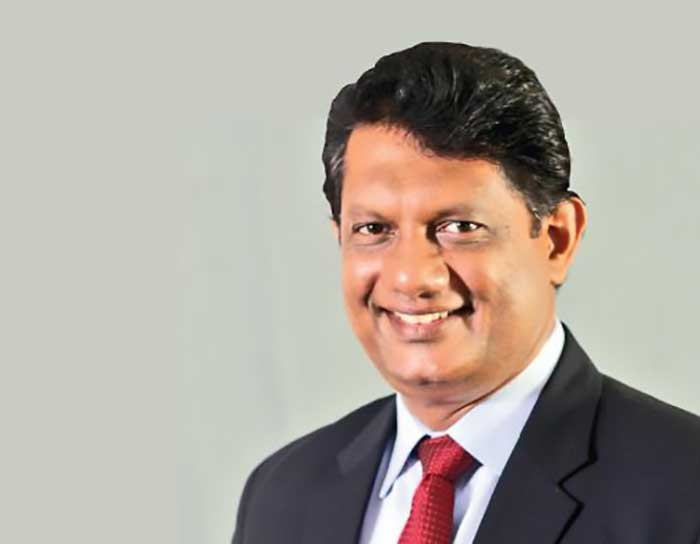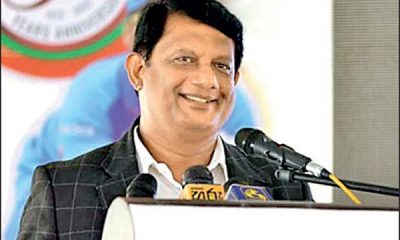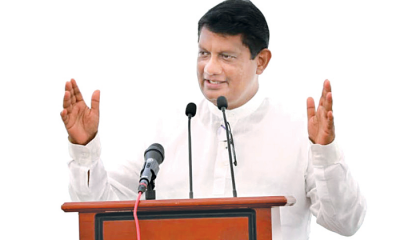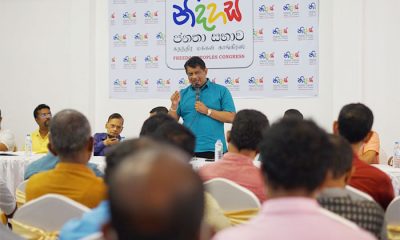News
Budget lacks creative solutions and exacerbates existing crisis – Dr. Godahewa

Budget 2024 is like a fairy tale rather than a pragmatic solution to pressing economic issues, SLPP MP Dr. Nalaka Godahewa has said.
Taking part in the current budget debate, former State Minister said: “Two paramount challenges loom large—the persistent economic contraction and the escalating national debt. A practical budget should provide answers to these challenges, addressing how the government plans to revitalize the economy and escape the debt trap. Unfortunately, the 2024 Budget falls short, lacking creative solutions and potentially exacerbating existing conditions.
The government, once again, presents optimistic revenue targets, reminiscent of the previous year. A notable income shortfall in 2023 raises concerns about the feasibility of the projected 45% increase in revenue for 2024, especially given the ongoing economic contraction. The Budget seems to harbor unrealistic expectations, and if history is any guide, the actual revenue may fall short, as evidenced by the 17% income deficit in 2023.
The Budget’s approach to expenditure compounds the issue. Despite potential revenue shortfalls, government expenditure for 2024 is estimated at 6978 billion rupees, reflecting a substantial 34% increase from the latest estimates of 2023. To meet revenue targets, the government resorts to tax hikes, exemplified by the recent VAT increase from 15% to 18%, affecting essential goods like fuel, electricity, and telephone charges.
This tax-heavy approach, a commonly accepted economic principle, can discourage entrepreneurs, decrease investments, and lead to tax evasion. Such consequences contribute to the 17% income deficit in 2023 and may persist in the coming year, rendering the 45% revenue increase target for 2024 unrealistic.
The Budget gap, arising when government revenue falls short of expenditure, is projected to be Rs 2851 billion in 2024. Bridging this gap through further borrowings or printing money is not a sustainable solution, particularly if the borrowed funds are directed toward consumption rather than income-generating development activities.
The breakdown of government expenditure for 2024 reveals a disproportionate focus on recurrent expenditure (Rs 5345 billion) compared to capital expenditure (Rs 1209 billion). This reflects an 11% increase in recurrent expenditure and a 1% decrease in capital expenditure for 2024. Despite promises to prioritize education and human capital development, the budgeted expenditure on education remains stagnant, and expenditure on women and social empowerment is halved.
The looming tax interest of Rs 2,634 billion, almost half of total recurring expenses, underscores the severity of the situation. Excessive borrowings have led the country into this crisis, and the trend continues, with the 2024 Budget proposing to borrow nearly Rs 3 trillion, exacerbating the existing debt burden.
The President’s grand ideas, articulated in the three main pillars of economic recovery—export-oriented competitive economy, environmentally friendly green and blue economy, and a digital economy—have not seen substantial progress after a year. The lack of consistency, evident in the shift towards a gig economy in the latest Budget, is a persistent issue.
Public trust in the government’s economic management and budgetary proposals has eroded. Citizens’ immediate concerns revolve around basic needs, rising utility bills, and the disparity between lofty economic goals and daily struggles. The prevailing crisis demands a unified and committed leadership capable of delivering tangible results.
The lack of coordination between ministries further compounds the challenges. Conflicting government actions, such as advocating for investment while raising production costs, or acknowledging the importance of the small and medium sector while undermining local producers through imports, highlight the need for cohesive decision-making.
To navigate the crisis successfully, the country requires a clear agenda, a consensus-driven roadmap led by competent leaders for effective implementation. Setting clear priorities with measurable targets in crucial areas like tax collection, tourism, export development, renewable energy, and foreign direct investment is imperative.
The proposed Budget for 2024, if implemented, not only fails to address critical issues but may exacerbate economic challenges. The country urgently needs a comprehensive economic development plan with clear goals, timelines, and accountability measures. The government must redirect its focus toward reactivating the economy, strengthening the export sector, fostering tourism, supporting small and medium businesses, attracting new investments, and addressing the root causes of the economic downturn.
In conclusion, at this darkest hour, a collective and committed leadership is essential to guide the nation out of the crisis. The time for experiments and ad hoc solutions has passed. It’s time for an integrated economic development plan to rebuild the country.”
News
US sports envoys to Lanka to champion youth development

The U.S. Embassy in Colombo welcomed the U.S. Sports Envoys to Sri Lanka, former National Basketball Association (NBA) and Women’s National Basketball Association (WNBA) players Stephen Howard and Astou Ndiaye, from June 8 through 14.
The Public Diplomacy section of the U.S. Embassy said that it would launch a weeklong basketball program intended to harness the unifying power of sports, made possible through collaboration with Foundation of Goodness and IImpact Hoop Lab.
While in Sri Lanka, Howard and Ndiaye, both retired professional basketball players, will conduct a weeklong program, Hoops for Hope: Bridging Borders through Basketball. The Sports Envoys will lead basketball clinics and exhibition matches and engage in leadership sessions in Colombo and Southern Province for youth aged 14-18 from Northern, Uva, Eastern and Western Provinces, offering skills and leadership training both on and off the court. The U.S. Envoys will also share their expertise with the Sri Lanka Basketball Federation, national coaches, and players, furthering the development of basketball in the country. Beyond the clinics, they will collaborate with Sri Lankan schoolchildren to take part in a community service project in the Colombo area.
“We are so proud to welcome Stephen and Astou as our Sports Envoys to Sri Lanka, to build on the strong people-to-people connections between the United States and Sri Lanka,” said U.S. Ambassador Julie Chung. “The lessons that will be shared by our Sports Envoys – communication, teamwork, resilience, inclusion, and conflict resolution – are essential for leadership development, community building, equality, and peace. The U.S. Sports Envoy program is a testament to our belief that sports can be a powerful tool in promoting peace and unity.”
News
Rahuman questions sudden cancellation of leave of CEB employees

SJB Colombo District MP Mujibur Rahuman in parliament demanded to know from the government the reasons for CEB suspending the leave of all its employees until further notice from Thursday.
MP Rahuman said that the CEB has got an acting General Manager anew and the latter yesterday morning issued a circular suspending leave of all CEB employees with immediate effect until further notice.
“We demand that Minister Kanchana Wijesekera should explain this to the House. This circular was issued while this debate on the new Electricity Amendment Bill was pending. There are many who oppose this Bill. The Minister must tell parliament the reason for the urge to cancel the leave of CEB employees,” the MP said.However, Speaker Mahinda Yapa Abeywardena prevented Minister Wijesekera responding to the query and said that the matter raised by MP Rahuman was not relevant.
News
CIPM successfully concludes 8th Annual Symposium

The Chartered Institute of Personnel Management (CIPM) successfully concluded the 8th Annual CIPM Symposium, which took place on 31st May 2024. Themed “Nurturing the Human Element—Redefining HRM in a Rapidly Changing World,” the symposium underscored the pivotal role of human resource management (HRM) in today’s dynamic global landscape. Since its inception in 1959, CIPM has been dedicated to advancing the HR profession through education, professional development, and advocacy, solidifying its position as Sri Lanka’s leading professional body for HRM.
Ken Vijayakumar, the President of the CIPM, graced the occasion as the chief guest. The symposium commenced with the welcome address by the Chairperson, Prof. Arosha Adikaram, followed by the Web Launch of the Symposium Proceedings and Abstract Book by the CIPM President. The event featured distinguished addresses, including a speech by Chief Guest Ken Vijayakumar, President of CIPM, and an address by Guest of Honor Shakthi Ranatunga, Chief Operating Officer of MAS Holdings Pvt. Ltd., Sri Lanka.
The symposium also featured an inspiring keynote address by Prof. Mario Fernando, Professor of Management and Director of the Centre for Cross Cultural Management (CCCM) at the University of Wollongong, Australia.
Vote of Thanks of the inauguration session was delivered by Dr. Dillanjani Weeratunga, Symposium Co-chair.
The symposium served as a comprehensive platform for researchers to present their findings across a wide range of critical topics in HRM. These included Cultural Diversity and Inclusion, Talent Development and Retention, Ethical Leadership and Corporate Social Responsibility, Adapting to Technological Advancements, Mental Health and Well-being at Work, Global Workforce Challenges, Employee Empowerment, and Reskilling and Upskilling.
The plenary session was led by Prof. Wasantha Rajapakse. Certificates were awarded to the best paper presenters during the valedictory session, followed by a vote of thanks delivered by Kamani Perera, Manager of Research and Development.
The annual symposium of CIPM was a truly inclusive event, attracting a diverse audience that spanned undergraduates, graduates, working professionals, research scholars and lecturers. This widespread interest highlights the symposium’s significance in the field of HRM, offering a unique opportunity for everyone to network and learn from scholarly brains.The CIPM International Research Symposium was sponsored by Hambantota International Port, Sri Lanka Institute of Information Technology (SLIIT), E B Creasy & Co. PLC, and Print Xcel Company.
























